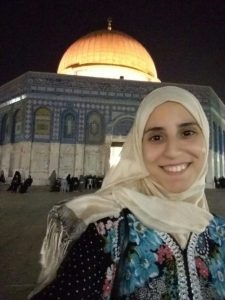Weekly journal of a child who was not allowed to be a child.
(Original title in Spanish “Diario semanal de un niño que no dejaron ser niño.”)
By Yusra el Kasmy el Kasmi.
Gaza city, present day.
-
Mondays
This time there are fourteen solders. But they are often many more. They break into a house, as a common practice, with their M16 rifles hanging from a shoulder. Wearing a badge written in Hebrew with an Israeli flag engraved on olive green uniform. A custom-made uniform for each of the men who perform a common scene: protected in full gear from head to toe, they struggle with a boy. His name is Zaid. Zaid cries inconsolably. One more arrest. They call it an “administrative” detention. Zaid does not know why they are taking his father or when, if ever, he will be able to see him again. His father does not know the evidence that they have against him. The occupiers don’t need it either: people can protest and deny as much as they want. They will not be listened to.
They cover his father’s eyes and tie his hands tightly with cables…. Zaid cries louder, but fear does not control of him. He has been told that TO RESIST IS TO EXIST and continues kicking, as best he can, at the soldiers who try to silence him and muffle his yelling. The children run toward their houses to tell the news of what is happening to their relatives: “al-jaish, al-jaish!” (“the army, the army!”). Triumphant, the solders mark the territory. They take the detainee, a father of six sons and, until now, the only bread-winner of the family. He will be subjected to an interrogation; he will be tortured and mistreated during his arrest. Zaid is lucky: at least he was not taken.
-
Tuesdays
Shaken, Zaid whispers between tears –“ ya baba…” (“dad”). A bulldozer 10 meters from his house is going to proceed with the demolition. According to the military, the house must be destroyed because his father is a delinquent and does not have official authorization to be owner of the piece of land upon which it stands. In Jerusalem, many settlements have been already built, countless ones. In other parts of the West Bank, Palestinian properties have been destroyed in order to build islands of Israeli settlements. Is it now my turn? Zaid asks himself. But a leech sucks with more energy with the passing of time: The occupiers expropriate, deprive, and steal land nonstop. Gaza is getting smaller all the time.
In that house, Zaid protected himself countless times from tear gas, from real bullets and plastic one, from the dirty water cannon shot by the occupiers; there when he played with his neighbors; in that home he grew up under the slogans of the occupation.
That home where he learned to resist and to normalize from day-to-day was now mere ruins…
-
Wednesdays
Zaid feels a wave of revulsion in the mouth of his stomach. When his mother died- was killed, actually- his father had to take care of him. He never has enough money to take care of all the expenses: food, education, medicines…given that he attends to business only a few hours per day, further limiting the children’s education. Worst of all, five of his six sons have been jailed without any reason.
Zaid spent the night in the ruins of his house. A neighbor begs him to come with him, but Zaid insisted on protecting the debris of his house. He won’t allow the soldiers to make his house into a victory for the occupation.
-Here I stay to protect what cost my father so much sweat -he declares.
-
Thursdays
In this way Mondays, Tuesdays, and Wednesdays passed for three consecutive months, a time during which Zaid was at the head of the line for humanitarian aid that came from abroad. An acquaintance of his older brother built him a shanty by the ruins of his house and this was the place where Zaid took refuge every night, rejecting the invitation of his neighbors and becoming a symbol of the resistance among Gazans. In the morning, he went to school. He was willing to fight the occupation by educating himself, since he was aware that education and learning made the Zionists furious. Afternoons and evenings, he sells bread one of his father’s friend’s business, in order to earn some money to cover the cost of food on days that international aid was scarce.
The closing of the Rafah passage had reduced the supply of international aid and medicines. Even seriously ill people don’t have authorization to cross the border except on limited occasions. The same happens with people who need to transfer from Gaza to Ramallah or to other West Bank cities for emergency surgery.
Gaza, converted into a real open-air prison, knew that it could never count on the construction of an airport to replace the one destroyed by the Israel Security Forces in 2001, nor on a seaport that would be within its inhabitants’ reach.
-
Fridays
Simultaneously with the call to prayer, a desperate cry breaks the harmony of the moment: a neighbor yells asking for help. Quickly, a group of people rushes in and gathers around a body. Shouts of Allahu Akbar are heard in unison. Zaid lays unconscious on the floor. A bullet seems to have penetrated his left lung. They called for an ambulance more than once. But Palestinian ambulances cannot get access because Israel blocks their circulation.
The military claims that they opened fire against the children because the children were throwing stones at them. They allege the children are responsible because they did not obey the warning shots in order to give up the shooting. The ambulance will not show up for two hours, at least. But Zeid is bleeding…
-
Saturdays
The ambulance is stopped at a checkpoint, waiting for the occupation to allow them to drive toward the hospital. Zaid lies unconscious, his condition deteriorating because the ambulance has no life support system. There is no oxygen tube either. Zaid’s life hangs by a thread. A paramedic pronounces the shahada for him. He seems to smell an imminent death.
-
Sundays
The hospital breathes horror: medicines and basic materials for treating patients and those injured by the Israelis attacks are lacking. After 12 long hours, Zaid is finally in a hospital bed. A British doctor intubates him and monitors his vital signs. They do not look favorable. However, the surgeons wash themselves as fast as possible. The first step is to extract the bullet.
But the day before, Palestinian militias launched handmade rockets from the Gaza Strip toward Israel to retaliate for the shooting that now threatens Zaid’s life. Israel responds: another electricity shutdown in the Al Shifa hospital, the main hospital complex in Gaza. All the generators stop. The twenty newborns who lie in the incubators all die. And the life of Zaid is turned off, also.
Epilogue
These are not merely the seven days of a week in Zaid’s life. They are the seven days of all the children who grow up in Palestine. Subjugated, oppressed, without right to a decent home, without right to a DIGNIFIED LIFE. They are witnesses to demolitions, land confiscations, murders, unfair arrests of their families. Subjected to illegal detentions and tortured for simply being Palestinians. But in a country subjected to a Zionist siege, Palestinians try to create a sense of normality to their lives and to resist the occupation. They are convinced that TO RESIST IS TO EXIST and their only request to the “Western” world is that you, like me, stop being accomplices to the passivity and silence.

The jury awarded this first prize for “highlighting and honouring the human capacity for resistance, expressed in a profoundly lyrical form. At the same time the jury considers the story’s narrative-logical structure – the passage of time, events which are suggested and others that occur – does not diminish in any way the opportunity offered to the reader to see themselves emotionally engaged with this work.















